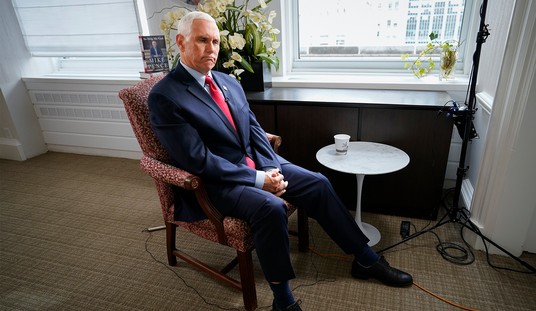It is a common complaint from George W. Bush’s critics that he is an “ideologue” or even the “most ideological president in history.” His critics, including the Democratic presidential contenders, often have argued that he ignores empirical evidence, whether about foreign policy or science, in order to maintain his devotion to predetermined and deeply held philosophical beliefs.
So shouldn’t pundits be wary of and be on the lookout for politicians who disregard the facts, overlook inconvenient evidence, and plunge ahead with their philosophically fixed plans, impervious to the real world? Well so far they seem utterly unconcerned that Barack Obama has racked up a fairly consistent record of doing just that.
Let’s take free trade. Obama’s own advisors and the overwhelming majority of economists agree that free trade agreements have created millions of jobs and benefited us both economically and diplomatically. Yet Obama advocates a new era of protectionism. He falsely tells crowds in the Rust Belt that NAFTA has cost us jobs (actually we have gained 26 million jobs since it was signed) and is responsible for untold economic distress. Ah, but you say, he doesn’t really mean that — this is not really ideology run amok, but pandering. Perhaps.
Well then, there is health care. Both he and Hillary Clinton favor enormously expensive national plans which to one degree or another would require coverage and put the government in the position of subsidizing and regulating private insurance plans. However, we know now from empirical evidence in Massachusetts that these plans don’t result in universal coverage and are horrendously expensive. California’s Democratic-controlled legislature abandoned its idea for universal coverage because it simply cost too much. Does any of this affect Obama’s thinking? Apparently not.
It is the same story on tax policy. He likes the idea of increasing the capital gains tax. He does not much care for factual data demonstrating beyond any reasonable doubt that increasing the capital gains rates will decrease revenue. Rather, he has, dare we say, an ideological goal in mind: make the rich pay more, even if it costs the U.S. treasury money. At least he is honest about this one.
Foreign policy is no different. He and other Democrats criticized President Bush and Defense Secretary Donald Rumsfeld for ignoring the facts on the ground in Iraq for years which indicated the country was descending into civil war. Yet since the military and political successes resulting from the surge have convinced even former war critics that real progress has been made, has Obama acknowledged the new facts and adjusted his views? Not quite.
As Michael O’Hanlon of the Brookings Institute explained, Obama, in addition to impugning the motives of war supporters, doesn’t spend much time on the facts:
Mr. Obama’s second Iraq problem is his insistence that, whatever happens there during 2008, he would withdraw all our main combat forces in the first 16 months of his presidency. … Strategically, it makes little sense to rush for the exits in Iraq when violence has declined by two-thirds over the last year — a remarkable accomplishment that Mr. Obama belittled in Manchester, NH, during the Democratic debate on Saturday when he claimed that such a development only brought Iraq back to 2006 levels of lethality (which is probably not true).
Mr. Obama’s other comment Saturday, that Sunni tribes only organized against al-Qaeda after Democrats won the 2006 Congressional elections, was also incorrect. The Sunni awakening began earlier, for reasons having little to do with American politics.
Forget the facts. Any political or military gains in Iraq, according to Obama, are only “tactical.”
Obama does not even go to Iraq for two years (he went once for two days in 2006), nor does he receive individual briefings from General Petraeus. He has already determined that whatever the success of the U.S. and Iraqi forces in Sadr City and Basra, whatever the performance of the Iraqi army, and whatever the level of violence, we have already been defeated and must leave immediately.
In rejecting John McCain’s invitation for a joint visit to Iraq, Obama’s spokesman declared that “we don’t need any more ‘Mission Accomplished’ banners or walks through Baghdad markets to know that Iraq’s leaders have not made the political progress that was the stated purpose of the surge.” No word on why the passage of key political benchmarks doesn’t qualify as “political progress.” In short, facts don’t matter.
Likewise, Obama has lambasted the Bush administration for its “cowboy diplomacy” and failure to consult with its allies. But, of course, the second Bush term has been a monument to multilateralism.
Has the failure of European diplomacy (to which the U.S. deferred) to curb Iran’s nuclear program impacted Obama’s thinking? Has the nuclear test by North Korea and its assistance with a Syrian nuclear facility dimmed his views of the efficacy of these approaches? He does not even acknowledge that these developments have occurred. His belief in the bountiful fruits of multilateral diplomacy is undiminished. (Even many mainstream media outlets recognize that we should learn from Iran’s track record in snubbing international agreements that “negotiations won’t work” absent some real leverage.)
And then there is a small, but eerie parallel. Bush was skewered for revealing that he did not read the newspapers, sure fire evidence, the critics said, of his unwillingness to get facts unfiltered by his staff. But then we learn from Obama’s aide: “One cardinal rule of the road is, we don’t watch CNN, the news, or MSNBC. We don’t watch any talking heads or any politics.”
So why does all of this ideological inflexibility and aversion to facts not bother the same pundits who pleaded with Bush to pay attention to the real world? It is not hard to figure out why. When the outcome is to its liking (e.g., pursuing withdrawal from Iraq) the mainstream media is second to no one in ignoring inconvenient evidence. It is not surprising then that Iraq has largely disappeared from the front pages of most major newspapers.
The great irony of the Democratic nomination process has been that in an election year in which the public is supposedly fed up with extreme partisanship and ideological extremism, the Democrats selected the most liberal member of the Senate, who averts his eyes when confronted with data that does not match up with his ideological convictions. This does not seem to bother his media fan club, nor concern those who are convinced that he represents an entirely new approach to politics. Perhaps it should.
The real test of an “ideologue” is not how strongly or how eloquently he expresses deeply held views, but whether he can account for new data and adjust policy designs to reflect the real world. If voters think the current administration has been unwilling or delinquent in doing those things, they may be sorely disappointed in an Obama administration.









Join the conversation as a VIP Member